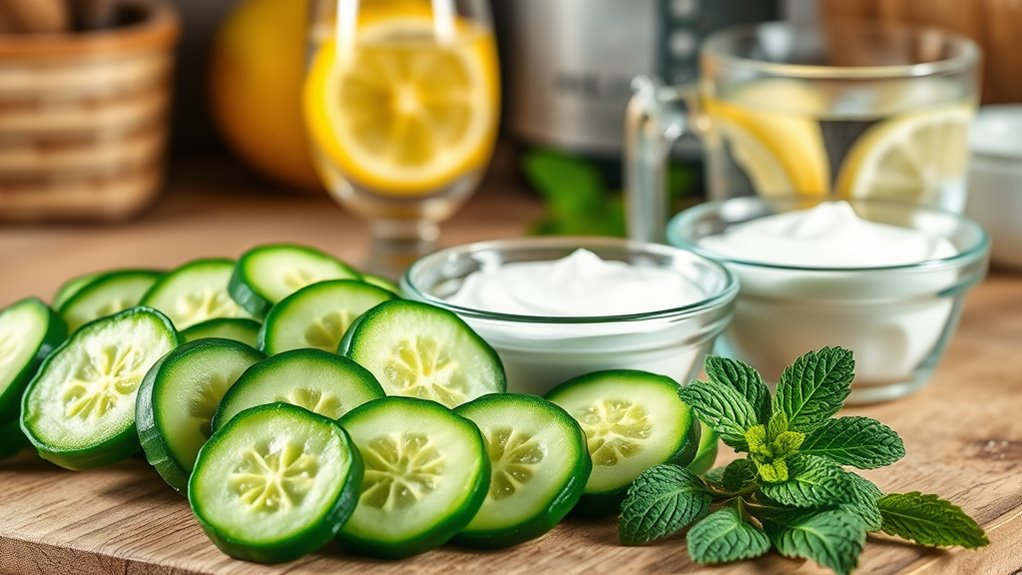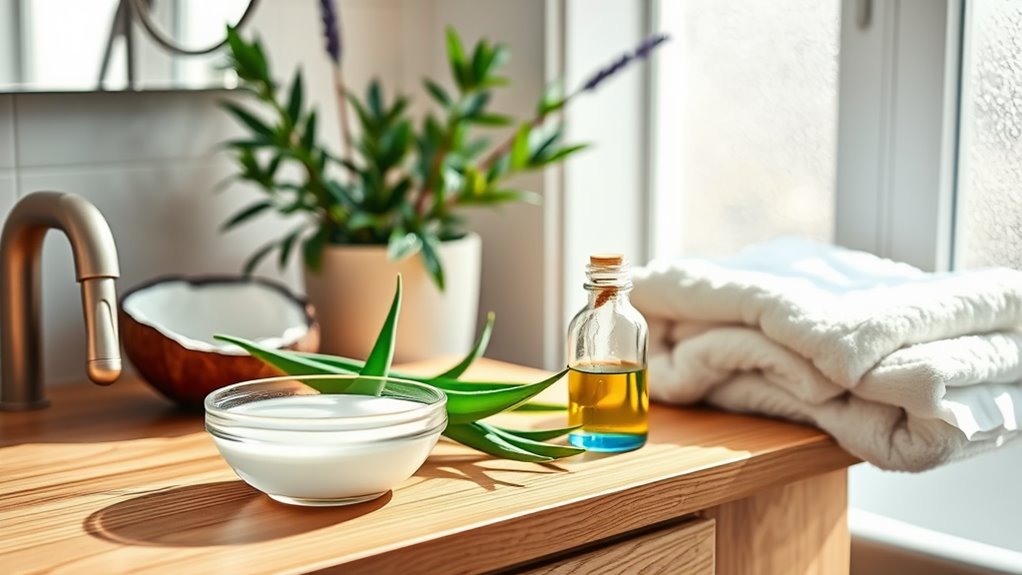Banish That Bloat! Natural Tricks That Work
Feeling a bit puffy? It’s a common issue, and you don’t have to live with that discomfort. There are simple, natural strategies that can help alleviate bloating and restore your comfort. By making a few adjustments to your daily routine, you can find real relief. Curious about what these tricks entail? Let’s explore effective methods that can lead to a flatter tummy and overall well-being.
Key Takeaways
- Stay hydrated by drinking at least eight glasses of water daily to reduce bloating and flush out excess sodium.
- Incorporate probiotic-rich foods like yogurt and kimchi to balance gut flora and improve digestion.
- Practice gentle yoga poses and stretching techniques to stimulate digestion and relieve abdominal tension.
- Use natural remedies like peppermint and ginger to relax the digestive tract and alleviate discomfort.
- Manage dietary habits by eating slowly, avoiding gas-producing foods, and keeping a food diary to identify triggers.
Stay Hydrated With Water and Herbal Teas
Have you ever wondered how staying hydrated can help reduce bloating?
Drinking plenty of water is one of the simplest bloated belly remedies. When you’re hydrated, your body flushes out excess sodium and reduces water retention. Aim for at least eight glasses a day.
Herbal teas, like peppermint or ginger, can also soothe your digestive system. Sip on these between meals to help alleviate discomfort and promote digestion.
Remember, cutting back on dehydrating beverages, like soda or coffee, can make a significant difference too. Additionally, adequate hydration is crucial as it aids in efficient food breakdown and digestion, further helping to mitigate bloating.
Staying hydrated is an essential step to feeling lighter and more comfortable in your body.
Incorporate Probiotic-Rich Foods
Staying hydrated is just one piece of the puzzle when it comes to reducing bloating. Incorporating probiotic-rich foods into your diet can greatly help your gut health and digestion. These foods introduce beneficial bacteria that balance your gut flora, aiding in smoother digestion and less gas. Additionally, incorporating a balanced diet rich in fiber supports overall digestive wellness.
| Probiotic Food | Benefits | Tips for Use |
|---|---|---|
| Yogurt | Boosts digestion | Add to smoothies or snacks |
| Sauerkraut | Improves gut health | Use as a side dish |
| Kimchi | Enhances nutrient absorption | Pair with main meals |
| Kefir | Supports immune function | Drink as a revitalizing beverage |
Try adding these tasty options to your meals!
Try Gentle Yoga and Stretching
Embrace the soothing benefits of gentle yoga and stretching to combat bloating effectively. These practices help stimulate digestion and relieve tension in your abdomen.
Simple poses like Child’s Pose or Cat-Cow can encourage movement within the digestive tract. Incorporating deep breathing can enhance relaxation and reduce stress, which can worsen bloating. Research shows that everyday habits like chewing gum can contribute to bloating, making these gentle movements even more beneficial.
Spend just 15-20 minutes daily on these stretches, focusing on your breath and body awareness. You’ll likely find that gentle movements promote circulation and ease discomfort, making it easier to feel light and free.
Use Peppermint and Ginger for Relief
Sipping on peppermint tea or enjoying a ginger-infused snack can greatly alleviate bloating and digestive discomfort.
Both peppermint and ginger have natural properties that soothe your stomach and promote digestion.
Peppermint relaxes the muscles in your gastrointestinal tract, reducing cramping and gas.
Meanwhile, ginger stimulates saliva and bile production, helping your body break down food more efficiently.
You can easily incorporate these ingredients into your diet by brewing tea, adding fresh ginger to smoothies, or snacking on ginger chews. Additionally, regular consumption of these remedies can lead to fewer digestive issues, enhancing your overall digestive wellness.
Avoid Overeating and Eat Mindfully
While natural remedies like peppermint and ginger can provide quick relief from bloating, your eating habits play a significant role in digestive comfort.
To avoid overeating, pay attention to your body’s hunger signals. Eat slowly, savoring each bite, and put your fork down between bites. This gives your brain time to register fullness.
Try to limit distractions during meals—turn off the TV or put away your phone.
Additionally, portion your meals in smaller sizes to help control how much you eat. Implementing regular mealtimes can also prevent digestive disruptions and promote overall digestive health.
Limit Gas-Producing Foods
Certain foods can contribute greatly to bloating, and being mindful of what you eat can make a big difference in your digestive comfort. By limiting gas-producing foods, you can reduce discomfort and feel lighter. Here’s a quick reference to help you identify these foods:
| Gas-Producing Foods | Alternatives |
|---|---|
| Beans | Lentils |
| Broccoli | Spinach |
| Onions | Green onions |
| Cauliflower | Zucchini |
| Soda | Herbal tea |
Try to swap out these items for alternatives and notice how your body responds. Keeping a food diary can help you identify triggers and improve your gut health. Your gut will thank you!
Keep a Food Diary to Identify Triggers
Have you ever wondered what specific foods might be causing your bloating? Keeping a food diary can help you pinpoint those culprits. Start by jotting down everything you eat and drink, along with the time and any symptoms you experience. This practice will reveal patterns and trigger foods that lead to discomfort. Be consistent—track your meals for at least a week. Review your entries to identify any connections between certain foods and bloating. Once you know your triggers, you can adjust your diet accordingly, making it easier to enjoy meals without the worry of unwanted bloat. Additionally, consider including potassium-rich foods in your diet, as they can help alleviate bloating symptoms.




